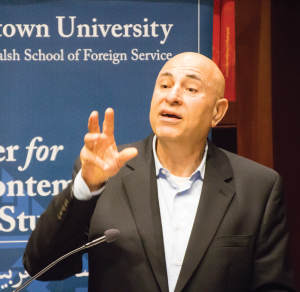
Saleh Abdel Jawad spoke about Palestinian perceptions of the Ottoman Empire during WWI on Monday as part of the Middle East Lecture Series.
Saleh Abdel Jawad delivered a lecture about Palestinian perceptions of Ottomans during World War I in an event sponsored by the Center for Contemporary Arab Studies and the Georgetown Institute for Global History on Monday evening. The lecture was part of the 2013-2014 Middle East and North Africa Public Lecture Series and Workshops “The New Middle East: The First World War 100 Years Later.”
“While my research is trying, as many other scholars have, to deconstruct the Arab-dominant narrative that participates in painting a counternarrative, which obviously has political implications, my argument, however, should be taken as a contribution to an academic debate, not as an opinion piece,” Abdel Jawad said.
Jawad is the 2013-14 Andrew Carnegie Centennial Fellow at the Center for Contemporary Arab Studies. He is also the author and editor of several books and articles on the Palestinian national movement.
“My research reveals an enduring loyalty for the Ottomans among the non-elite Palestinians before and during the war, and, in some cases, even after the war,” Abdel Jawad said.
Abdel Jawad stated that Arab-Turkish relations remain a challenging subject to define in historiographical and political terms.
“The Turkish view wanted to portray the Arabs … as those who stabbed them in the back,” Abdel Jawad said. “This is interesting because Muslims and Turks that served during the war knew that hundreds of thousands of Arab soldiers fought until the end with the Ottoman Empire.”
Numerous historians of Arab nationalism, Turkish nationalism, Zionism and the West have depicted Arabs as being opposed to Ottomans during the war. They describe the “Great Arab Revolt” as Arabs aiming to secure independence from Ottoman Turks.
“For the most part, the history of the war we have in Arab and Palestinian historiography has been viewed primarily from the [perspective of the] Ottoman national elite,” Abdel Jawad said. “The nature of this line of argument, as some will remind us, recalls [the warning] of the danger of considering advancing national ideas as the sole measure of agency in the 20th-century Arab world.”
Using oral sources, Abdel Jawad found that, contrary to popular opinion, Palestinians held pro-Turkish sentiments before and during the war.
Abdel Jawad noted that oral arguments have developed because of the societies from which they come. Information is primarily spread by mouth in Arab countries, which makes it difficult to locate and validate.
“It was almost impossible not to use oral sources to write about the 1940s because most of our Britain documents were either destroyed or confiscated,” Abdel Jawad said. “But most important of that, Arab societies, even still today, are oral societies.”
Another difficulty that Abdel Jawad faced with oral sources was a lack of firsthand experiences. Many of the people who experienced the era were of old age or deceased during his research.
“Some of the interviews are done by their grandsons,” Abdel Jawad said. “They have also memories from their grandfathers but they died.”
Since history was spread by word of mouth, Abdel Jawad hypothesizes that the memory of what sentiments were toward Ottomans changed over time.
“If you go today, to the West Bank, and you do oral interviews, most of the people will give you an anti-Ottoman view,” Abdel Jawad said. “Why? Because the collective memory was infiltrated later. It was very important in this case to have those who lived the moment.”
Abdel Jawad argued that those who were against the Ottoman Empire were their own soldiers.
“This idea is that most of the rebels of the revolt in 1936 were also the main leaders were soldiers in the Ottoman army or they were friends of the Ottoman army,” Abdel Jawad said.
Abdel Jawad concluded by explaining why there were different narratives of the war that contradicted his findings.
“There is not enough data to explain fully the enduring loyalty of the auxiliary people but what seems obvious through my interviews is that Islam, which was a main component of the Ottoman identity, was a rallying point for this solidarity and loyalty,” Abdel Jawad said.
Tyler Patrick (SFS ’15) attended the lecture because he was interested in how the history of the Palestinian movement could relate to his international economics major.
“The speaker noted that more Muslims were pro-Ottoman during that period because of the shared link of Islam and someone asked the question if that continued today,” Patrick said. “That spurred for me an economic question of, if there were free trade between the different Palestinian territories and their neighbors, would shared feelings of Islam impact the degree of international trade?”














